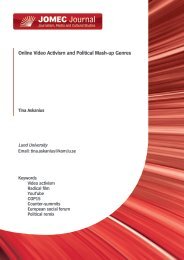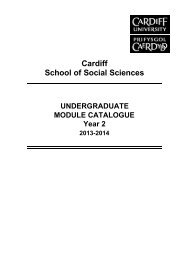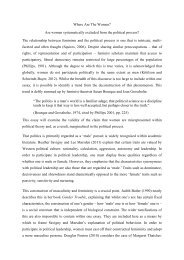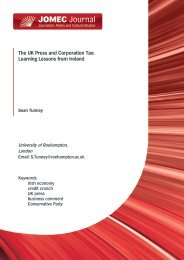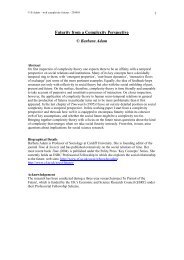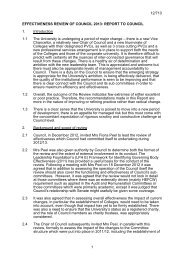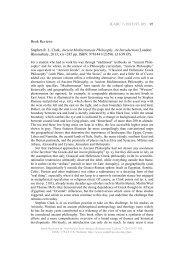APHRODITE IN PROCLUS' THEOLOGY - Cardiff University
APHRODITE IN PROCLUS' THEOLOGY - Cardiff University
APHRODITE IN PROCLUS' THEOLOGY - Cardiff University
You also want an ePaper? Increase the reach of your titles
YUMPU automatically turns print PDFs into web optimized ePapers that Google loves.
JLARC 3 (2009) 21-43 41<br />
among them the first monad for Rhea and Aphrodite. The third term of the noeticnoeric<br />
triad is, in the language of the Phaedrus, the subcelestial vault. The third<br />
triad in its totality is love (the first divine Eros) that mirror in its level intelligible<br />
beauty (corresponding triad in the intelligible level) and raises ascending souls<br />
towards it. The noeric gods are arranged into a hebdomad composed of the two<br />
triads and the demiurgic monad. On the first level Rhea manifests herself as an<br />
identified deity mediating between Cronus and Zeus. One of the operations of the<br />
demiurge is the castration of the previous fathers, which is the symbol for the birth<br />
of the internally differentiated world of forms. Through this operation Aphrodite<br />
is born as a hypercosmic and hypercosmic-encosmic principle of demiurgy and<br />
providence. In her procession, the goddess who pre-exists in her monads on the<br />
higher levels, gains an articulated identity and reveals herself as a divinity whose<br />
task is to harmonize and recuperate unity. For Proclus Aphrodite is greater than<br />
love. Love is the power in life, and Aphrodite is the most uniform and purest life<br />
at the hypercosmic level, the Uranic summit in Aphrodite being “the flower of<br />
life”.<br />
The theory of the divine series enables Proclus to defend Aphrodite in all the<br />
forms of her traditional cult against the “great confusion”. It is possible to pray to<br />
and to celebrate Aphrodite, even from the popular, and even vulgar, viewpoint, as<br />
the protectress of earthly love. But a Neoplatonic sage, who has attained Plato’s<br />
mystical vision, connects the worship of the goddess to the philosopher’s aim of<br />
identifying with the One present in the human soul, and because of this she or he<br />
asks and deserves from the immaculate Erototokos even better gifts than those<br />
desired by the Trojan prince.<br />
Tuomo Lankila, ‘Aphrodite in Proclus’ Theology,’ in: Journal for Late Antique Religion and<br />
Culture 3 (2009) 21-43; ISSN: 1754-517X; Website: http://www.cardiff.ac.uk/clarc/jlarc




